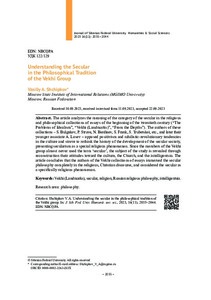Understanding the Secular in the Philosophical Tradition of the Vekhi Group
Автор:
Shchipkov, Vasiliy A.
Щипков, В. А.
Дата:
2023-11Журнал:
Журнал Сибирского федерального университета. Гуманитарные науки. Journal of Siberian Federal University. Humanities & Social Sciences; 2023 16 (11)Аннотация:
The article analyzes the meaning of the category of the secular in the religious and philosophical collections of essays of the beginning of the twentieth century (“The Problems of Idealism”, “Vekhi (Landmarks)”, “From the Depths”). The authors of these collections – S. Bulgakov, P. Struve, N. Berdiaev, S. Frank, S. Trubetskoi, etc., and later their younger associate A. Losev – opposed positivism and nihilistic-revolutionary tendencies in the culture and strove to rethink the history of the development of the secular society, presenting secularism as a special religious phenomenon. Since the members of the Vekhi group almost never used the term ‘secular’, the subject of the study is revealed through reconstruction their attitudes toward the culture, the Church, and the intelligentsia. The article concludes that the authors of the Vekhi collections of essays immersed the secular philosophy completely in the religious, Christian discourse, and considered the secular as a specifically religious phenomenon Статья анализирует понимание категории «секулярное» в религиозно-философских
«веховских» сборниках начала XX века («Проблемы идеализма», «Вехи»,
«Из глубины»). Авторы этих сборников (С. Булгаков, П. Струве, Н. Бердяев, С. Франк,
С. Трубецкой и др., а позже – их младший соратник А. Лосев), выступавшие против
позитивизма и нигилистически-революционных
тенденций в культуре, пытались
переосмыслить историю развития светского общества, показать секулярность как
особое религиозное явление. Поскольку «веховцы» не употребляли сам термин
«секулярное», предмет исследования раскрывается методом реконструкции, путём
изучения их взглядов на проблему культуры, Церкви, интеллигенции. В статье
сделан вывод, что авторы «веховских» сборников полностью погружали секулярную
философию в религиозный, христианский дискурс, а секулярное мыслили как
специфически религиозное явление

